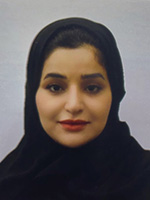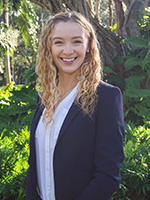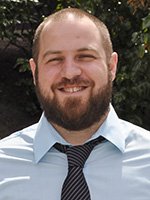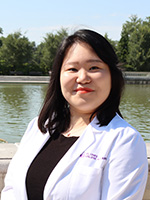ASPET is proud to announce the selection of ten awardees to participate in the 2023 Washington Fellows program. The mission of the Washington Fellows program is to enable developing and early career scientists interested in science policy to learn about and become more engaged in public policy issues. Get to know this year’s class:
Rehab Alharbi – Howard University
 Rehab was born and raised in Riyadh, Saudi Arabia. She received her bachelor’s degree in pharmacy from King Saud University. Then she worked as a pharmacist at the Ministry of Health. Following her undergraduate education, she studied for her master’s degree in Pharmaceutical Science at King Saud University. Upon graduation, she was privileged to work at the Drug and Poison Information Center, which presented new opportunities and challenges. It provides a scientific reference for the health staff in the hospital and the region and offers evidence-based medical advice to deal with poisoning cases and pharmaceutical inquiries. It also develops workplace policies and improves guidelines for patient safety. She enjoyed working on regulations and policies until she was promoted to the Quality Department, where she worked for a year as a quality coordinator and then as the supervisor of the Quality and Patient Safety Department. She worked collaboratively with senior leadership, physicians, nurses and pharmacists to develop and implement quality and patient safety standards to ensure regulatory compliance and accreditation. She is currently pursuing her PhD in health outcomes research in the department of Pharmacy Administration at Howard University. Under the mentorship of Dr. Marry Maneno, her research is focused on medication-related health services and pharmacoepidemiology in the areas of medication safety, medication use in specific populations and medication adherence. As an ASPET Washington Fellow, Rehab hopes to leverage her pharmacist and research experience to develop safer and more effective drug regulations.
Rehab was born and raised in Riyadh, Saudi Arabia. She received her bachelor’s degree in pharmacy from King Saud University. Then she worked as a pharmacist at the Ministry of Health. Following her undergraduate education, she studied for her master’s degree in Pharmaceutical Science at King Saud University. Upon graduation, she was privileged to work at the Drug and Poison Information Center, which presented new opportunities and challenges. It provides a scientific reference for the health staff in the hospital and the region and offers evidence-based medical advice to deal with poisoning cases and pharmaceutical inquiries. It also develops workplace policies and improves guidelines for patient safety. She enjoyed working on regulations and policies until she was promoted to the Quality Department, where she worked for a year as a quality coordinator and then as the supervisor of the Quality and Patient Safety Department. She worked collaboratively with senior leadership, physicians, nurses and pharmacists to develop and implement quality and patient safety standards to ensure regulatory compliance and accreditation. She is currently pursuing her PhD in health outcomes research in the department of Pharmacy Administration at Howard University. Under the mentorship of Dr. Marry Maneno, her research is focused on medication-related health services and pharmacoepidemiology in the areas of medication safety, medication use in specific populations and medication adherence. As an ASPET Washington Fellow, Rehab hopes to leverage her pharmacist and research experience to develop safer and more effective drug regulations.
Stanley Cheatham – Virginia Commonwealth University

Stanley was born and raised in Richmond, Va. He graduated from Virginia Commonwealth University with a bachelor’s degree in biology. During his undergraduate career he co-founded a student organization that sought to increase minority participation in medicine. While at Virginia Commonwealth University he was a participant in LEAD, a living-learning community that taught the fundamentals of leadership. As a capstone project for LEAD, he received the IMSD fellowship where he was finally able to explore his fascination for drugs of abuse and their intersection with the microbiome. Upon graduating he then spent a year as a PREP scholar at Virginia Commonwealth University. He is now a 3rd year PhD candidate in pharmacology and toxicology at Virginia Commonwealth University under the tutelage of Dr. Hamid I. Akbarali. As a PhD student he was appointed to a NIH T32 fellowship. His research is now focused on the role of cholinergic input during chemotherapy induced diarrhea. As an ASPET Washington Fellow, Stanley hopes to use the skills and training he will receive to be an advocate for minority participation in STEM. He hopes to bridge the divide between science and politics.
Cuauhtemoc Ulises Gonzalez – University of Texas

Ulises was born in Cerritos, San Luis Potosi, Mexico and immigrated to Lavergne, Tenn. where he was raised since the age of seven. As a first-generation college student, he received his bachelor’s degree in biochemistry from Middle Tennessee State University (MTSU). While at MTSU, he was involved in bioorganic research where he used vibrational spectroscopy to study protein conformations and in psychology research where he investigated cultural differences in flashbulb memory. Through these experiences, Ulises found his passion for neuroscience and went on to pursue his masters at the University of Texas at Dallas (UTD). At UTD, he worked on investigating the role of NMDA subtype receptors in strong fearful memories to understand methods in attenuating maladaptive memories. Currently, Ulises is pursuing his PhD under the mentorship of Dr. Vasanthi Jayaraman at the University of Texas MD Anderson Cancer Center at the UTHealth Houston Graduate School of Biomedical Sciences. His research examines the structural and functional properties of ionotropic glutamate receptors. Specifically, he is investigating how trans-synaptic interactions between neurexins and glutamate receptors modulate the gating properties of these channels which ultimately affect neuronal firing and behavior. Ulises has enjoyed volunteering as a reading tutor to immigrant children and as a soccer coach to underserved youth at the YMCA. As an APSET Washington Fellow, Ulises hopes to learn how he can be involved in the policy making process as a scientist to help underserved communities obtain affordable healthcare and medication. He also hopes to promote STEM education in these communities.
Chloe Kirk – University of Miami
 Chloe is originally from Saint Paul, Minn. She earned her bachelor’s degree in molecular biology and legal studies from the University of Wisconsin-Madison where she became interested in the intersection of science, law and policy. Outside of classes, she was able to explore different types of science research which led to her passion for cell biology. During her undergraduate education, Chloe also learned the importance of science outreach and communication. She helped organize an annual STEM immersion bootcamp at her university and ran events to provide resources to science majors through the university’s library. Chloe is currently pursuing her PhD in biochemistry and molecular biology at the University of Miami. Under the mentorship of Dr. Stephen Lee, her research focuses on the ways cells respond to stress, specifically how cells can disassemble physiological amyloids termed Amyloid-bodies. Beyond her research, Chloe has stayed involved with her science outreach and communication efforts in graduate school by co-founding her department’s student government, joining the university’s graduate student government (most recently as the Vice President), organizing science field trips with a local high school and becoming a research commercialization fellow to learn how to effectively market academic research. Outside of school, she started her own blog and social media sharing life as a PhD student, volunteers through Skype a Scientist to share her research with K-12 students across the country and contributes interviews and science articles for ASBMB and ASCB. As an ASPET Washington Fellow, Chloe plans to learn how she can harness her experience in science research and communication to advocate for increased funding in biomedical research and STEM education resources.
Chloe is originally from Saint Paul, Minn. She earned her bachelor’s degree in molecular biology and legal studies from the University of Wisconsin-Madison where she became interested in the intersection of science, law and policy. Outside of classes, she was able to explore different types of science research which led to her passion for cell biology. During her undergraduate education, Chloe also learned the importance of science outreach and communication. She helped organize an annual STEM immersion bootcamp at her university and ran events to provide resources to science majors through the university’s library. Chloe is currently pursuing her PhD in biochemistry and molecular biology at the University of Miami. Under the mentorship of Dr. Stephen Lee, her research focuses on the ways cells respond to stress, specifically how cells can disassemble physiological amyloids termed Amyloid-bodies. Beyond her research, Chloe has stayed involved with her science outreach and communication efforts in graduate school by co-founding her department’s student government, joining the university’s graduate student government (most recently as the Vice President), organizing science field trips with a local high school and becoming a research commercialization fellow to learn how to effectively market academic research. Outside of school, she started her own blog and social media sharing life as a PhD student, volunteers through Skype a Scientist to share her research with K-12 students across the country and contributes interviews and science articles for ASBMB and ASCB. As an ASPET Washington Fellow, Chloe plans to learn how she can harness her experience in science research and communication to advocate for increased funding in biomedical research and STEM education resources.
Paul Panipinto – Washington State University
 Paul was born in California and raised in Seattle. He received his bachelor’s degree in molecular, cellular and developmental biology from the University of Washington’s Seattle Campus. Following his undergraduate education, he continued with the University of Washington as a research scientist in their College of Medicine’s Division of Rheumatology. His desire to advance his scientific career led him to continue his study of inflammatory and autoimmune diseases at Washington State University’s College of Pharmacy and Pharmaceutical Science PhD program. Under the mentorship of Dr. Salahuddin Ahmed, his F-31 funded research is focused on elucidating mechanistic differences between small molecule inflammatory kinase inhibitors. In addition to research, he has remained active in outreach via volunteer work with local school programs, holding college and university level leadership positions, as well as mentorship with the Graduate Student Research Association and the Association for Women in Science. As an ASPET Washington Fellow, Paul hopes to learn how to leverage his leadership and research experience to effectively advocate for the importance of supporting STEM education and funding biomedical research.
Paul was born in California and raised in Seattle. He received his bachelor’s degree in molecular, cellular and developmental biology from the University of Washington’s Seattle Campus. Following his undergraduate education, he continued with the University of Washington as a research scientist in their College of Medicine’s Division of Rheumatology. His desire to advance his scientific career led him to continue his study of inflammatory and autoimmune diseases at Washington State University’s College of Pharmacy and Pharmaceutical Science PhD program. Under the mentorship of Dr. Salahuddin Ahmed, his F-31 funded research is focused on elucidating mechanistic differences between small molecule inflammatory kinase inhibitors. In addition to research, he has remained active in outreach via volunteer work with local school programs, holding college and university level leadership positions, as well as mentorship with the Graduate Student Research Association and the Association for Women in Science. As an ASPET Washington Fellow, Paul hopes to learn how to leverage his leadership and research experience to effectively advocate for the importance of supporting STEM education and funding biomedical research.
Sabrina Rahman Archie – Texas Tech University Health Sciences Center
 Sabrina was born and raised in Dhaka, Bangladesh. She received her Bachelor of Pharmacy and Master of Pharmacy degrees from Faculty of Pharmacy, University of Dhaka, Bangladesh. Afterwards, she started her career as a lecturer at BRAC University and later she joined University of Dhaka. During her tenure as a lecturer in pharmaceutical sciences, she was actively involved in teaching and research. Currently, she is pursuing her PhD at Texas Tech University Health Sciences Center (TTUHSC) in pharmaceutical sciences. Under the mentorship of Dr. Thomas J. Abbruscato, her research is focused on evaluating the harmful effects of maternal electronic cigarette (e-Cig) use on postnatal cerebrovascular and neuroimmune system. Thereby identifying prenatal e-Cig exposure as a significant determinant of negative maternal and/or pediatric health outcome. She is also investigating the role of e-Cig on the expression and activity of drug metabolizing enzymes and transporters to elucidate potential risks of drug interaction in presence of e-Cig use. Besides conducting research, she is actively engaged in outreach and advocacy. She served as the president of the Graduate Student Association in Amarillo and as the graduate student representative for Research Advisory Committee, Graduate Council and Graduate Program Committee to care and support issues related to graduate studies at TTUHSC. Currently she is serving as a student ambassador for Diversity and Inclusion and contributing to implementing campus diversity initiatives to support underrepresented groups at TTUHSC. As an ASPET Washington Fellow, Sabrina hopes to learn more about evidence-based healthcare policymaking at the state and federal levels and thus pave the path for developing regulatory guidelines and policies for the betterment of public health focusing on maternal and pediatric populations.
Sabrina was born and raised in Dhaka, Bangladesh. She received her Bachelor of Pharmacy and Master of Pharmacy degrees from Faculty of Pharmacy, University of Dhaka, Bangladesh. Afterwards, she started her career as a lecturer at BRAC University and later she joined University of Dhaka. During her tenure as a lecturer in pharmaceutical sciences, she was actively involved in teaching and research. Currently, she is pursuing her PhD at Texas Tech University Health Sciences Center (TTUHSC) in pharmaceutical sciences. Under the mentorship of Dr. Thomas J. Abbruscato, her research is focused on evaluating the harmful effects of maternal electronic cigarette (e-Cig) use on postnatal cerebrovascular and neuroimmune system. Thereby identifying prenatal e-Cig exposure as a significant determinant of negative maternal and/or pediatric health outcome. She is also investigating the role of e-Cig on the expression and activity of drug metabolizing enzymes and transporters to elucidate potential risks of drug interaction in presence of e-Cig use. Besides conducting research, she is actively engaged in outreach and advocacy. She served as the president of the Graduate Student Association in Amarillo and as the graduate student representative for Research Advisory Committee, Graduate Council and Graduate Program Committee to care and support issues related to graduate studies at TTUHSC. Currently she is serving as a student ambassador for Diversity and Inclusion and contributing to implementing campus diversity initiatives to support underrepresented groups at TTUHSC. As an ASPET Washington Fellow, Sabrina hopes to learn more about evidence-based healthcare policymaking at the state and federal levels and thus pave the path for developing regulatory guidelines and policies for the betterment of public health focusing on maternal and pediatric populations.
Caitlin Risener – Emory University
 Caitlin is a 5th year PhD candidate at Emory University in the Molecular and Systems Pharmacology program. Prior to graduate school, Caitlin studied at Lipscomb University and graduated in 2016 with dual master’s and bachelor’s degrees in molecular biology. Following graduation, Caitlin briefly worked at a dermatology clinic as a technician, which sparked her interest in pathogens and pharmacology. She then worked at Vanderbilt University as a technician under the guidance of Dr. Erkan Karakas, where she learned structural biology techniques and further strengthened her interest in drug development. For her doctoral research under the mentorship of Dr. Cassandra Quave, she utilizes a one-of-a-kind natural product library as a screening tool to discover novel antiviral compounds active against SARS-CoV-2. Her research is multidisciplinary, spanning ethnobotany, virology and pharmacology. Outside of her research, Caitlin is passionate about science communication and mentoring, as demonstrated by her involvement in training numerous undergraduate students in the lab and holding multiple teaching assistantships. As an ASPET Washington Fellow, Caitlin looks forward to building upon her science communication skills and developing knowledge and experience in public policy to advocate for natural product regulation and research funding.
Caitlin is a 5th year PhD candidate at Emory University in the Molecular and Systems Pharmacology program. Prior to graduate school, Caitlin studied at Lipscomb University and graduated in 2016 with dual master’s and bachelor’s degrees in molecular biology. Following graduation, Caitlin briefly worked at a dermatology clinic as a technician, which sparked her interest in pathogens and pharmacology. She then worked at Vanderbilt University as a technician under the guidance of Dr. Erkan Karakas, where she learned structural biology techniques and further strengthened her interest in drug development. For her doctoral research under the mentorship of Dr. Cassandra Quave, she utilizes a one-of-a-kind natural product library as a screening tool to discover novel antiviral compounds active against SARS-CoV-2. Her research is multidisciplinary, spanning ethnobotany, virology and pharmacology. Outside of her research, Caitlin is passionate about science communication and mentoring, as demonstrated by her involvement in training numerous undergraduate students in the lab and holding multiple teaching assistantships. As an ASPET Washington Fellow, Caitlin looks forward to building upon her science communication skills and developing knowledge and experience in public policy to advocate for natural product regulation and research funding.
Yearam Tak – University of Health Sciences and Pharmacy in St. Louis

Yearam was born in Seoul, South Korea. She received her bachelor’s degree in pharmaceutical sciences from University of Health Sciences and Pharmacy in St. Louis. As an undergraduate student, she developed her passion for science and healthcare through participation in academic research and community projects. Following her undergraduate education, she decided to pursue a Doctor of Pharmacy degree at St. Louis College of Pharmacy at UHSP. Under the mentorship of Dr. Bhooma Aravamuthan, her research is focused on understanding motor phenotype characterization of animal models of disease that can serve as the basis for drug development as well as the physiology of dystonia in cerebral palsy. In addition to research, she is actively engaged in outreach and advocacy. She serves as the founder of a nonprofit organization focused on providing mentoring and tutoring services to underprivileged high school students. Yearam also serves as president of the St. Louis Health Outreach Organization, which is focused on providing health updates and connection between local clinics and community members. As an ASPET Washington Fellow, Yearam hopes to gain a deeper understanding in regulatory science and learn how to effectively advocate for evidence-based drug policy and biomedical research.
Elijah Zorro Ullman – Emory University

Elijah was raised in Manhattan Beach, Calif., and Boulder, Colo. He received his Bachelor of Science degree in cellular and molecular neurosciences from Colorado State University in 2019. Prior to this he did two summer stints at the University of Montana in 2016 and 2017, as a Summer Undergraduate Research Fellow studying NMDA Receptor pharmacology. Since high school, he has been involved in drug policy reform via Students for Sensible Drug Policy, starting one of the organization’s first high-school chapters, and later a chapter at Colorado State University. Currently he serves as the co-chair for the Science Policy Council for Students for Sensible Drug Policy. He is pursuing his PhD in molecular and systems pharmacology at Emory University under the mentorship of Dr. Stephen F. Traynelis. His project seeks to understand the mechanisms of action underlying ionic permeation and conductance of the NMDA Receptor, and how allosteric modulators can modify these properties. He has been called the “Electrophysiology Cowboy” by friends due to his love of patch-clamping new frontiers and bluegrass and the Grateful Dead. As an ASPET Washington Fellow, Elijah hopes to advocate for increased scientific funding for both the NIH and science education to enhance scientific research and literacy. In addition, he hopes to use the skills learned through the program to be a better drug policy reform advocate at the national level.
Donnell White, III – Louisiana State University Health Sciences Center New Orleans

Don was born in Bozeman, Mont., and raised in Southeast Arkansas. He graduated from the University of Arkansas at Monticello in 2017 with a bachelor’s degree in biology and biochemistry. He joined a chemistry lab in his first year of university, where he characterized fatty acids in novel strains of algae. In the summer of 2016, he worked under Dr. Ernst at the University of Colorado Anschutz Medical Campus, where he had his first experience with translational research. Seeing firsthand how science translates to medicine was pivotal in his decision to pursue a dual MD/PhD degree. After graduation, Don moved to Maryland, where he worked as a post-baccalaureate trainee at The National Institutes of Health National Cancer Institute. The following year, Don moved to New Orleans to begin his training as a medical scientist at Louisiana State University Health Sciences Center New Orleans. Under the mentorship of Dr. Yang, he is currently investigating the use of a novel mouse model of type II diabetes and obesity, in addition to developing innovative methods to evaluate and quantify the effects of drugs on metabolism in single cells. Throughout graduate school, he has been active in student government, volunteering at a nearby homeless shelter and preparing undergraduate students to submit medical school applications. Don enjoys running outdoors and working out at his local CrossFit gym in his free time. Up to this point, Don’s experience in science has been learning how it is done - not how it is regulated. As an ASPET Washington Fellow, Don hopes to learn more about the details behind science policymaking, and how to effectively use his working scientific knowledge in a manner that will allow him to contribute to this process.